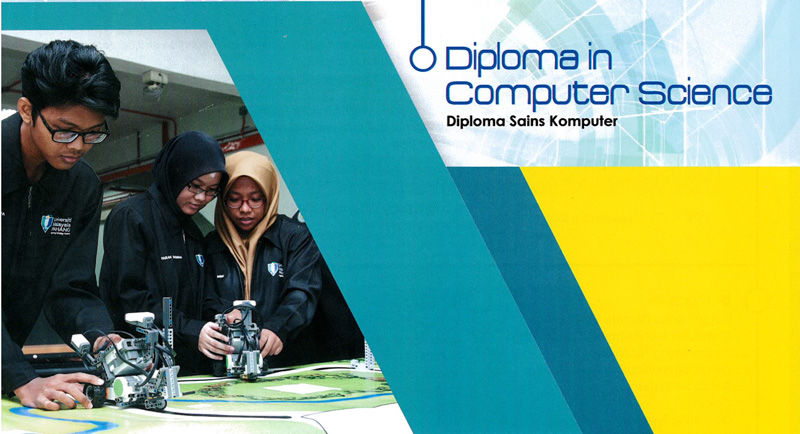Diploma in Computer Science

COURSE DESCRIPTION
The ICT has changed the current practices of managing business. Skilled workers in ICT are sought after in order for businesses to sustain their operations in digital world. Therefore, this program is designed to provide a foundation of computer science skills and knowledge to groom the graduates for working in areas such as programming, web development, and ICT support. In the first year of study, the students will learn basic computer science knowledge such as problem solving, database, system development and programming. The following year, students will be equipped with in-depth knowledge and skills required to use computer tools and software in developing a computer application. With the acquired knowledge and skills after graduation, students have a choice of whether to work in the ICT industry or further studies in computing.
PROGRAM EDUCATIONAL OBJECTIVE
| PEO1 | To produce knowledgeable and skilled graduates to work in any organisation, whether national, multi-national, government agencies or as techno-entrepreneurs in ICT-related fields, particularly in the field of Computer Systems and Networks |
| PEO2 | To produce graduates who are able to practice high professional ethical values. |
PROGRAM OUTCOMES
| No | MQF | Program Learning Outcome |
| PO1 | Knowledge and understanding | Demonstrate knowledge and understanding of Computer Science theories and principles. |
| PO2 | Cognitive skills | Demonstrate intellectual independence in the application of knowledge in Computer Science practice by applying critical skills, analytical skills and evaluation skills. |
| PO3 | Practical skills | Apply techniques, skills and equipment appropriate to the field of Computer Science to understand the field of knowledge and problem solving. |
| PO4 | Interpersonal skills | Demonstrated ability to have communication and collaboration skills in teams and organizations. |
| PO5 | Communication skills | Communicate clearly and effectively in the presentation of written and oral ideas accurately, confidently and coherently in the appropriate context and language. |
| PO6 | Digital skills | Use the appropriate technology to solve the problem at hand. |
| PO7 | Numeracy skills | Apply qualitative and quantitative mathematical tools in analyzing and evaluating numerical, graphic or visual data to solve problems in a real context. |
| PO8 | Leadership, autonomy & responsibility | Demonstrated leadership skills autonomously over a team that has been held accountable. |
| PO9 | Personal skills | Able to manage oneself effectively and involve oneself effectively in lifelong learning to achieve self-sustainability, competitiveness and ability to work. |
| PLO10 | Entrepreneurship skills | Promoting entrepreneurial thinking and innovative thinking in the field of Computer Science. |
| PLO11 | Ethics and profesionalism | Demonstrate ethical behavior and act professionally in a variety of environments and practices. |
PROGRAM COURSES
|
FACULTY CORE (27 CREDIT HOURS)
|
FINAL YEAR PROJECT (8 CREDIT HOURS)
INDUSTRIAL TRAINING (12 CREDIT HOURS)
ELECTIVE (BY SELECTION - 9 CREDIT HOURS)
|
|
PROGRAM CORE (18 CREDIT HOURS)
|
|
UNIVERSITY GENERAL COURSES (16 CREDIT HOURS)
|
|
| Total Credit Hours for graduation are 90 | |
CAREER OPPORTUNITIES
Graduates of UMP are equipped with skills in Computer Science and softskills as an added value which allows them to build a career as:
Assistant Analyst Programmer
Programmer
Web Developer
Computer Technician
IT Assistant
IT Support Executive
Assistant Information System Administrator
Assistant Database Administrator
Assistant IT Executive
Assistant Software Engineer
Technopreneur

